In the era of ESG (Environmental, Social and Governance), Cecafé is up to date and proactive on all issues related to new regulatory trends in major global markets.
As often reported, the sustainability agenda includes a number of regulatory projects approved in the European bloc to hold companies accountable for how they address environmental and social issues.
This is the case with EU and UK proposals for mandatory corporate due diligence (DD) to measure and mitigate deforestation risks in their supply chains.
In Germany, a similar law was passed in 2021 that will take effect in 2023 and become more stringent in 2024. Companies will be required to monitor risks and report on human rights and environmental abuses, and DD obligations will be extended to foreign suppliers.
Other countries, such as Switzerland and the United States, are also debating new rules on deforestation-free trade and corporate social responsibility.
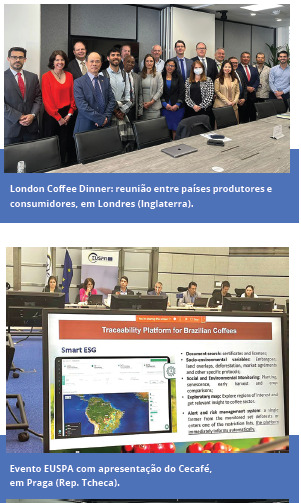
Cecafé has participated in several global forums in London, Brussels, Berlin and Prague to influence the overall implementation process of the new European Union law, together with our partners, the European Coffee Federation (ECF), the Digital Integration of Agricultural Supply Chains Alliance (DIASCA), the Deutsche Gesellschaft für Internationale Zusammenarbeit (GIZ) and the Initiative for Sustainable Agricultural Supply Chains (INA), the National Coffee Association (NCA), the International Coffee Organization (ICO), the International Trade Center (ITC), the Global Gateway, the British Coffee Association (BCA), the European Commission and, in particular, the European Union Space Agency (EUSPA).
The discussion also involves the Brazilian government, through meetings with the Vice President of the Republic and Minister of Development, Industry, Trade and Services (MDIC), Geraldo Alckmin, together with the Minister of Agriculture and Livestock, Carlos Fávaro, and agendas with the Ministries of Environment and Foreign Affairs, Embassies, Missions in London and Brussels with Ambassadors, diplomats and agricultural attachés.
In this sense, Cecafé, in a solid partnership with ECF, has found a strategic path within EUSPA to demonstrate the progress made in the sustainability of Brazilian coffee in recent decades, as well as the challenges within the coffee chain of custody for the required monitoring, with the aim of directing the regulatory debates as Brazil has structured itself.
EUSPA has the support of the European Commission to guide the new regulations, as well as to influence the new law in terms of deadlines and formats, given the greater contact with the reality of farming, processing, classification and blends, and export process.
During 2023, several face-to-face events were held in which Cecafé presented the Brazilian Traceability Platform, developed by Serasa Experian and implemented institutionally and with the necessary adaptations in progress by Cecafé and its partners. The platform shows how Brazilian coffee production has evolved in terms of sustainability in recent decades, the experience of the Forest Code and the Rural Environmental Registry (CAR) in obtaining polygons and geo-referenced data, as well as the current level of forest conservation in the producing regions. The challenges of the coffee chain of custody were also highlighted, from the diversity of regions, farmers and blending to containerized exports.
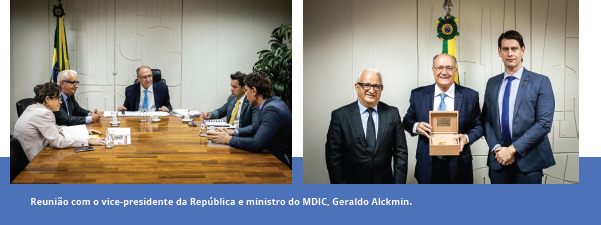
Based on the entire Brazilian legal framework and the availability of several public databases that Brazil has presented to major global importers and regulators, the country has been nominated as a pilot project, as an EU reference for the implementation of the new law, to generate knowledge, experience, and benchmarks for other origins.
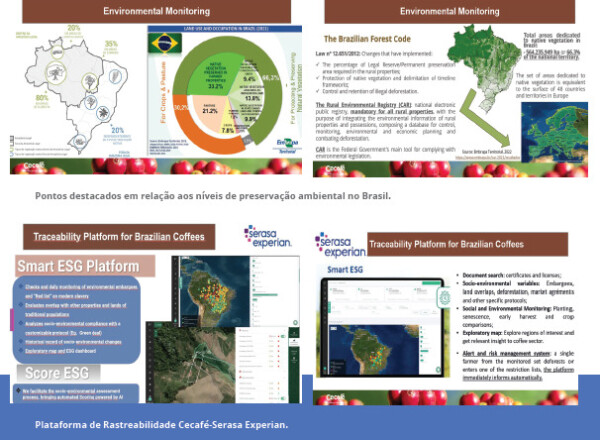
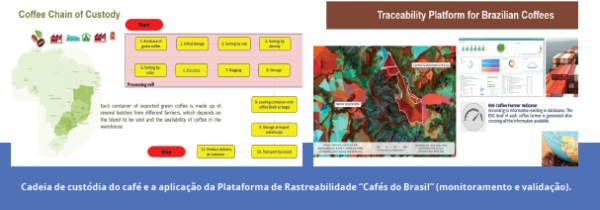
Throughout the second semester of 2023, as a Pilot Project, Cecafé will host members of EUSPA, ECF and the European Commission to monitor coffee exports from different regions and models, encompassing the reality of the chain of custody, with local warehouses, cooperatives and exporting companies.
During the second semester of 2023, as a pilot project, Cecafé will host members of EUSPA, ECF and the European Commission to monitor coffee exports from different regions and models, encompassing the reality of the chain of custody, with local warehouses, cooperatives and exporting companies.
The next steps will be to develop the implementation and guidelines based on the Brazilian experience, using real examples of trade flows from Brazil. This will serve as a reference for other countries wishing to export to the European Union.
On this occasion, it is of key importance to demonstrate the realities, challenges and risks of operations in order to guide new deadlines and future adjustments and improvements of the recently adopted the EU Deforestation Free Regulation.
It is important to highlight that EUSPA has reaffirmed Brazil’s prominent position, demonstrating organization, unity and efficiency, with greater knowledge of the “Brazilian Coffee” Traceability Platform.
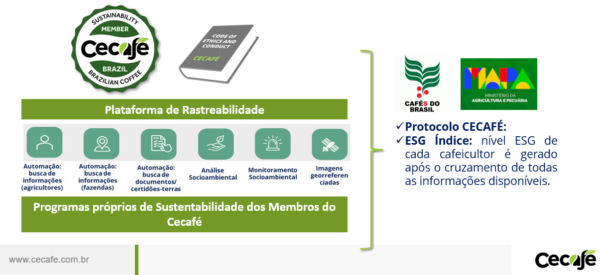
Marcos Matos
Diretor Geral do CECAFÉ
Silvia Pizzol
Gestora de
Sustentabilidade do CECAFÉ


Leave A Comment